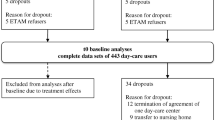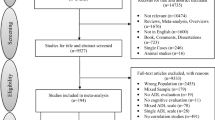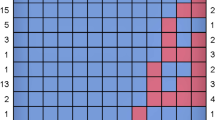Abstract
Background
The aim of this study was to describe an instrumental activities of daily living (IADL) measure: Functional Activities Questionnaire (FAQ), which is often used in clinical settings as a self- or informant-based measure of IADL. However, the FAQ’s relationship with age or education in healthy aging has not been investigated.
Methods
FAQ and a neuropsychological battery were administered to old and very old Czech adults (n = 540). Participants met strict inclusion criteria for the absence of any active or past neurodegenerative disorders.
Results
FAQ is significantly dependent on age and education, but not gender. Younger subjects and those with higher education have the lowest scores in the FAQ and show a higher degree of functional independence. FAQ moderately correlates with speed of processing, visual–perceptual and executive functions measures (Trail Making Tests, Stroop Test) and depressive symptoms, but not with episodic memory (WMS-III logical memory). We present normative percentile values for different age groups from 60 to 96 years of age.
Conclusions
The present study shows conclusively that IADL measures, such as FAQ, should not be used without appropriate normative data, especially in very old adults. Thus, it has the ability to differentiate functional dependence due to age-related decline from neurodegenerative disease.
Similar content being viewed by others
References
Katz S, Ford AB, Moskowitz RW (1963) Studies of Illness in the aged—the index of ADL—a standardized measure of biological and psychosocial function. JAMA 185:914–919
Lawton MP, Brody EM (1969) Assessment of older people: self-maintaining and instrumental activities of daily living. Gerontol 9:179–186
Galasko D, Bennett D, Sano M (1997) An inventory to assess activities of daily living for clinical trials in Alzheimer’s disease. The Alzheimer’s Disease Cooperative Study. Alzheimer Dis Assoc Disord 11:S33–S39
Petersen RC (2004) Mild cognitive impairment as a diagnostic entity. J Intern Med 256:183–194
Grundman M, Petersen RC, Ferris SH (2004) Mild cognitive impairment can be distinguished from Alzheimer disease and normal aging for clinical trials. Arch Neurol 61:59–66
McKhann GM, Knopman DS, Chertkow H (2011) The diagnosis of dementia due to Alzheimer’s disease: recommendations from the National Institute on Aging-Alzheimer’s Association workgroups on diagnostic guidelines for Alzheimer’s disease. Alzheimers Dement 7:263–269
Sikkes SA, de Lange-de Klerk ES, Pijnenburg YA (2009) A systematic review of instrumental activities of daily living scales in dementia: room for improvement. J Neurol Neurosurg Psychiatry 80:7–12
Lezak MD, Howieson DB, Bigler ED et al (2012) Neuropsychological Assessment, 5th edn. Oxford University Press, Oxford
Pfeffer RI, Kurosaki TT, Harrah CH Jr (1982) Measurement of functional activities in older adults in the community. J Gerontol 37:323–329
Castilla-Rilo J, López-Arrieta J, Bermejo-Pareja F (2007) Instrumental activities of daily living in the screening of dementia in population studies: a systematic review and meta-analysis. Int J Geriatr Psychiatry 22:829–836
Juva K, Mäkelä M, Erkinjuntti T (1997) Functional assessment scales in detecting dementia. Age Ageing 26:393–400
Mejia S, Gutiérrez LM, Villa AR (2004) Cognition, functional status, education, and the diagnosis of dementia and mild cognitive impairment in Spanish-speaking elderly. Appl Neuropsychol 11:196–203
Bezdicek J, Lukavsky, Preiss M (2011) Functional Activities Questionnaire, Czech Version—a validation study. Cesk Slov Neurol N 74:36–42
Albert SM, Michaels K, Padilla M (1999) Functional significance of mild cognitive impairment in elderly patients without a dementia diagnosis. Am J Geriatr Psychiatry 7:213–220
Tabert MH, Albert SM, Borukhova-Milov L (2002) Functional deficits in patients with mild cognitive impairment: prediction of AD. Neurology 58:758–764
Devanand DP, Liu X, Tabert MH (2008) Combining early markers strongly predicts conversion from mild cognitive impairment to Alzheimer’s disease. Biol Psychiatry 64:871–879
Lima-Silva TB, Bahia VS, Nitrini R (2013) Functional status in behavioral variant frontotemporal dementia: a systematic review. Biomed Res Int 2013:837120
Avlund K (1997) Methodological challenges in measurements of functional ability in gerontological research. A review. Aging (Milano) 9:164–174
Demers L, Oremus M, Perrault A (2000) Review of outcome measurement instruments in Alzheimer’s disease drug trials: psychometric properties of functional and quality of life scales. J Geriatr Psychiatry Neurol 13:170–180
Lindeboom R, Vermeulen M, Holman R (2003) Activities of daily living instruments: optimizing scales for neurologic assessments. Neurology 60:738–742
Pérès K, Helmer C, Amieva H (2008) Natural history of decline in instrumental activities of daily living performance over the 10 years preceding the clinical diagnosis of dementia: a prospective population-based study. J Am Geriatr Soc 56:37–44
Ivnik RJ, Malec JF, Tangalos EG et al (1990) The Auditory-Verbal Learning Test (AVLT): norms for ages 55 years and older. Psychol Assess J Consult Clin Psychol 2:304–312
Bezdicek O, Libon DJ, Stepankova H (2014) Development, validity, and normative data study for the 12-word Philadelphia Verbal Learning Test [czP(r)VLT-12] among older and very old Czech adults. Clin Neuropsychol 28:1162–1181
Steenland NK, Auman CM, Patel PM (2008) Development of a rapid screening instrument for mild cognitive impairment and undiagnosed dementia. J Alzheimers Dis 15:419–427
Štěpánková H, Nikolai T, Lukavský J et al (2015) Mini-mental state examination—Czech normative study. Cesk Slov Neurol N 78/111:57–63
Folstein MF, Folstein SE, McHugh PR (1975) “Mini-mental state”. A practical method for grading the cognitive state of patients for the clinician. J Psychiatr Res 12:189–198
Nasreddine ZS, Phillips NA, Bédirian V (2005) The Montreal Cognitive Assessment, MoCA: a brief screening tool for mild cognitive impairment. J Am Geriatr Soc 53:695–699
Bezdicek O, Balabanova P, Havrankova P (2010) A comparison of the Czech version of the Montreal cognitive assessment test with the mini mental state examination in identifying cognitive deficits in parkinson’s disease. Cesk Slov Neurol N 73:150–156
Troyer AK, Leach L, Strauss E (2006) Aging and response inhibition: normative data for the Victoria Stroop Test. Neuropsychol Dev Cogn B Aging Neuropsychol Cogn 13:20–35
Bezdicek O, Lukavsky J, Stepankova H et al (2015) Prague Stroop Test: a valid tool for Parkinson’s Disease Mild cognitive impairment subty** and normative data in older adults. J Clin Exp Neuropsychol. doi:10.1080/13803395.2015.1057106
Yesavage JA, Brink TL, Rose TL (1983) Development and validation of a geriatric depression screening scale—a preliminary-report. J Psychiatr Res 17:37–49
Nikolai T, Štěpánková H, Michalec J et al (2015) Verbal fluency tests - Czech normative study for older persons. Cesk Slov Neurol N 78/111:292–299
Wechsler D (2010) Wechslerova inteligenční škála pro dospělé: Hogrefe—Testcentrum
Bezdicek O, Motak L, Axelrod BN (2012) Czech Version of the Trail Making Test: normative data and clinical utility. Arch Clin Neuropsychol 27:906–914
Mack WJ, Freed DM, Williams BW (1992) Boston naming test: shortened versions for use in Alzheimer’s disease. J Gerontol 47:P154–P158
Wechsler D (2011) Wechslerova zkrácená paměťová škála—WMS-IIIa. Hogrefe—Testcentrum, Praha
R.C.T. R: A language and environment for statistical computing. R Foundation for Statistical Computing (2014). http://www.R-project.org/
Evans DA, Funkenstein HH, Albert MS (1989) Prevalence of Alzheimer’s disease in a community population of older persons. Higher than previously reported. JAMA 262:2551–2556
Garfein AJ, Herzog AR (1995) Robust aging among the young-old, old-old, and oldest-old. J Gerontol B Psychol Sci Soc Sci 50:S77–S87
Salthouse TA (1996) The processing-speed theory of adult age differences in cognition. Psychol Rev 103:403–428
Dennis NA, Cabeza R (2008) Neuroimaging of healthy cognitive aging. In: Craik FIM, Salthouse TA (eds) Handbook of aging and cognition, 3rd edn. Erlbaum, New Jersey, pp 1-54
Dodge HH, Du Y, Saxton JA (2006) Cognitive domains and trajectories of functional independence in nondemented elderly persons. J Gerontol A Biol Sci Med Sci 61:1330–1337
Kane MJ, Engle RW (2003) Working-memory capacity and the control of attention: the contributions of goal neglect, response competition, and task set to Stroop interference. J Exp Psychol Gen 132:47–70
Arbuthnott K, Frank J (2000) Trail making test, part B as a measure of executive control: validation using a set-switching paradigm. J Clin Exp Neuropsychol 22:518–528
Nunnally JC, Bernstein IH (1994) Psychometric Theory. Third edn. McGraw-Hill, Inc., New York
Knight RG, McMahon J, Green TJ (2004) Some normative and psychometric data for the geriatric depression scale and the cognitive failures questionnaire from a sample of healthy older persons. N Z J Psychol 33:163–170
Acknowledgments
The authors thank all the external administrators (Eva Biedermannova, Pavla Davidova, Lenka Freharova, Marketa Holubova, Karolina Horakova, Adela Jencova, Olga Kozicka, Lenka Malkova, Jiri Michalec, Barbora Mnukova, Vlasta Novotna, Klara Patlichova, Jana Pecinkova, Lucie Prazakova, Ilona Sedmidubska, Lenka Sreibrova, Nina Sterbova, Tomas Vacha, Martin Vaverka, Zuzana Velkoborska, Michaela Viktorinova, and Tomas Vilimovsky) and Jiri Lukavsky for his statistical analysis.
Funding
The work was supported by grants from the Internal Grant Agency of Ministry of Health of Czech Republic under grant number IGA MZCR NT 13145-4/2012 and by the project “National Institute of Mental Health (NIMH-CZ)“, under grant number ED2.1.00/03.0078, and the European Regional Development Fund. LMN is supported by Charles University Research Centre (UNCE 204004) and the Ministry of Education, Youth and Sports – Institutional Support for Longterm Development of Research Organizations—Charles University, Faculty of Humanities (project PRVOUK P20).
Author information
Authors and Affiliations
Corresponding author
Ethics declarations
Conflict of interest
The authors have no conflict of interest to declare.
Ethical approval
All procedures performed in studies involving human participants were in accordance with the ethical standards of the institutional and/or national research committee and with the 1964 Helsinki declaration and its later amendments or comparable ethical standards.
Informed consent
Informed consent was obtained from all participants for being included in the study.
Rights and permissions
About this article
Cite this article
Bezdicek, O., Stepankova, H., Martinec Novakova, L. et al. Toward the processing speed theory of activities of daily living in healthy aging: normative data of the Functional Activities Questionnaire. Aging Clin Exp Res 28, 239–247 (2016). https://doi.org/10.1007/s40520-015-0413-5
Received:
Accepted:
Published:
Issue Date:
DOI: https://doi.org/10.1007/s40520-015-0413-5




